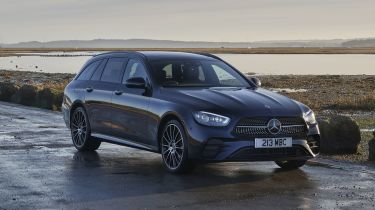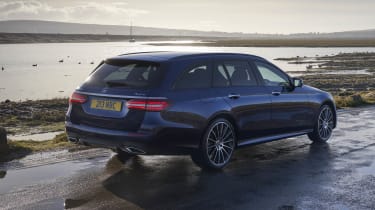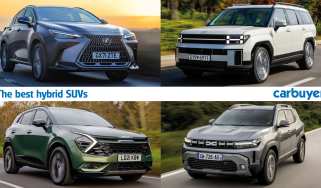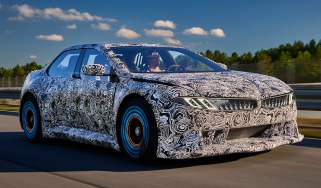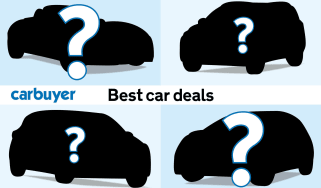Mercedes E-Class Estate - MPG, running costs & CO2
The Mercedes E-Class estate is reasonably efficient, especially in E 300 de plug-in hybrid guise
Mercedes knows the importance of economy and low emissions, not just for reasons of environmental responsibility, but also because good headline figures sell cars. A key feature of the latest model is a 2.0-litre diesel engine that offers the best fuel consumption an E-Class Estate has ever offered, while servicing costs are easy to predict.
Mercedes E-Class Estate MPG & CO2
The E-Class Estate engine range opens with a 2.0-litre petrol in the E 200 and its 38mpg economy figure should mean it’s not too expensive to run for lower-mileage drivers. It won’t appeal to many company-car drivers, as it sits in the top band for Benefit-in-Kind (BiK) tax.
The three-strong diesel range starts with the E 220 d, which achieves 50mpg in Sport trim, and along with the car’s large fuel tank this gives a very generous range fill-to-fill. Also impressive is the E 220 d’s CO2 output; at 148g/km, company-car drivers will be liable for a Benefit-in-Kind (BiK) rate of 33%. Bear in mind, though, that AMG Line models give off a higher figure due to the extra drag and friction of their bigger wheels and tyres.
Increased fuel consumption and CO2 emissions are also a consequence of choosing the E 300 d with its standard-fit 4MATIC four-wheel-drive system but the difference isn’t as marked as you might expect because it has mild-hybrid technology on board. It takes the fuel consumption down to 47mpg and ups CO2 emissions slightly but the car still escapes the top BiK rate. The E 400 d matches the petrol’s running costs but is much more powerful (and expensive to buy).
More reviews
The high-performance AMG E53 petrol is capable of returning 29.7mpg while emitting 211g/km of CO2. Running costs for the E63 S will be even steeper, with that car managing just 22.8mpg even with cylinder deactivation - and much less when you make use of the engine’s 604bhp.
After the first year's CO2-based road tax (generally included in the on-the-road price), every version of E-Class Estate costs nearly £500 a year to tax. That’s because cars with a list price (including options) of more than £40,000 are liable for an additional surcharge in years two to six, although after that the annual tax bill will drop to the standard rate.
Insurance group
The cheapest E-Class estate to insure is the entry-level E 200, which starts in group 33 out of 50. The E 220 d starts in 35, while the E 400 d is rated in group 44 and the E 300 de occupies groups 45-47. The high-performance E53 falls into group 44, while the E 63 S unsurprisingly has the highest possible insurance rating.
Warranty
All Mercedes models sold in the UK are covered by a three year/unlimited-mileage warranty. This can be extended yearly – owners can arrange warranty extensions by contacting the company directly via the Mercedes website.
Servicing
Every E-Class needs servicing once every year or every 15,500 miles, whichever happens first. Services alternate between minor and major, with additional operations occasionally due depending on model. Brake fluid will need to be changed every two years, as will the air-conditioning filter.
A Service Care plan can be arranged for either two, three or four years depending on your average mileage. Any Mercedes dealership can provide you with details. Service costs are set by the manufacturer, and precise quotes can be obtained on the Mercedes website.

